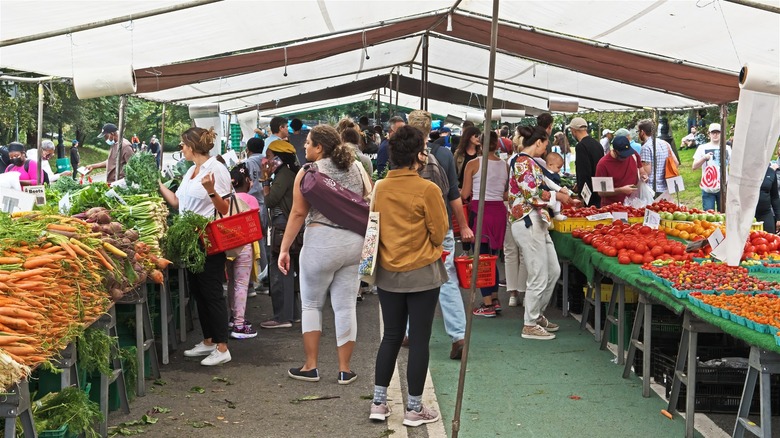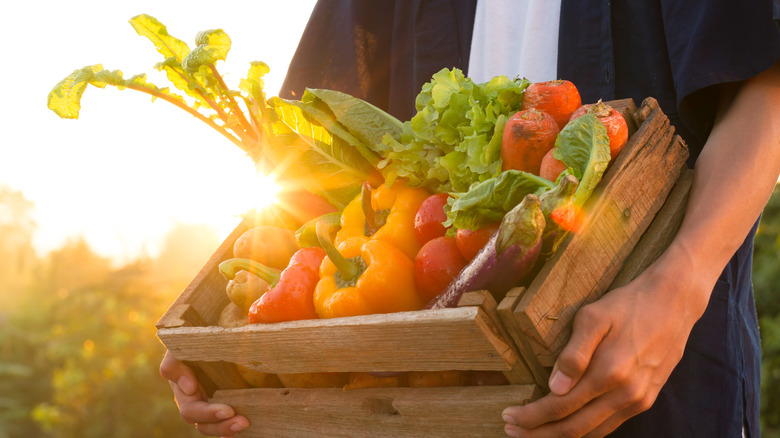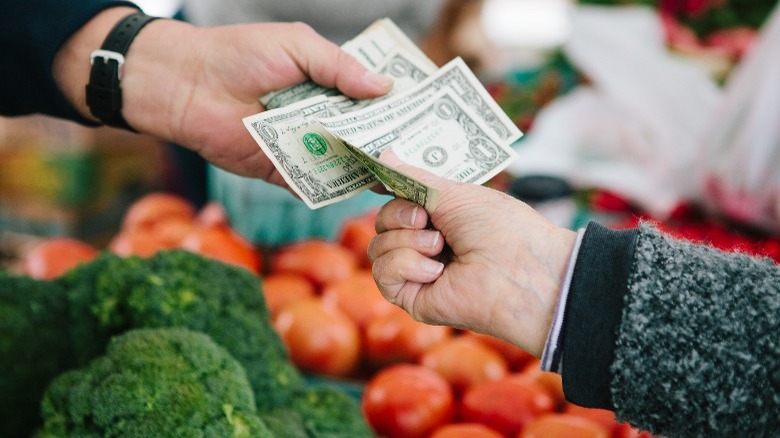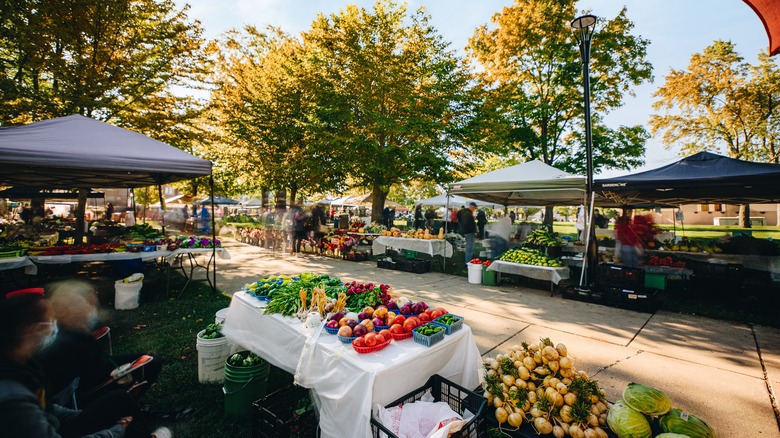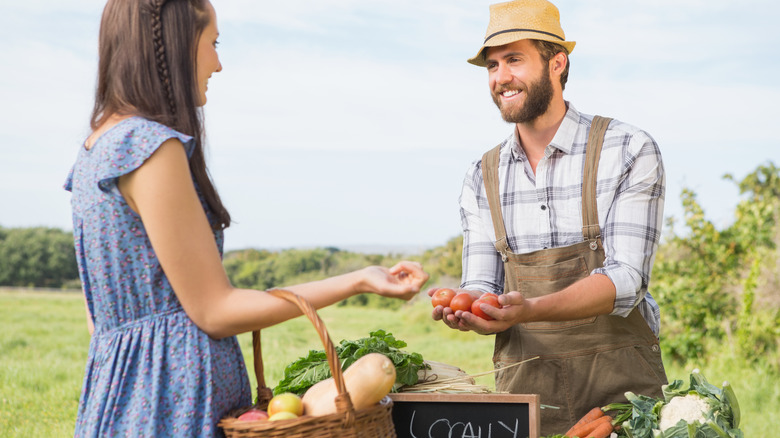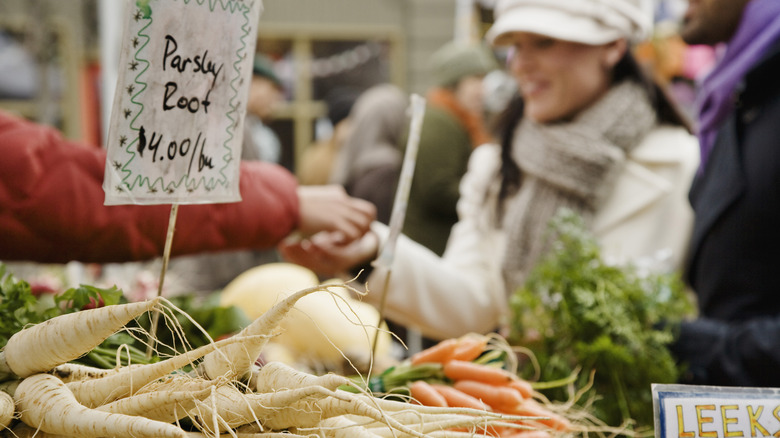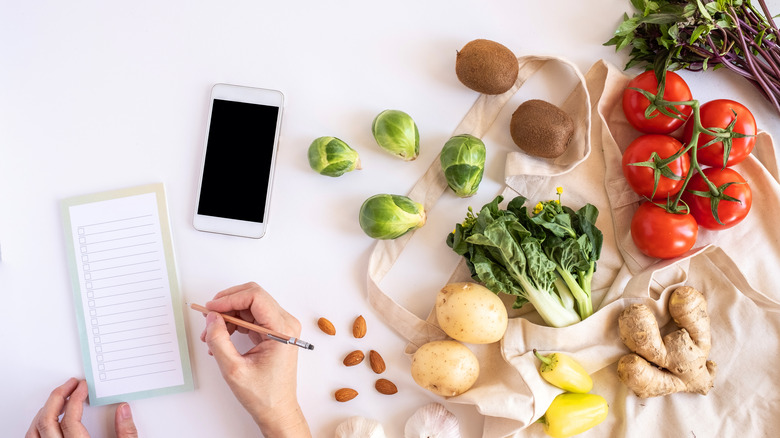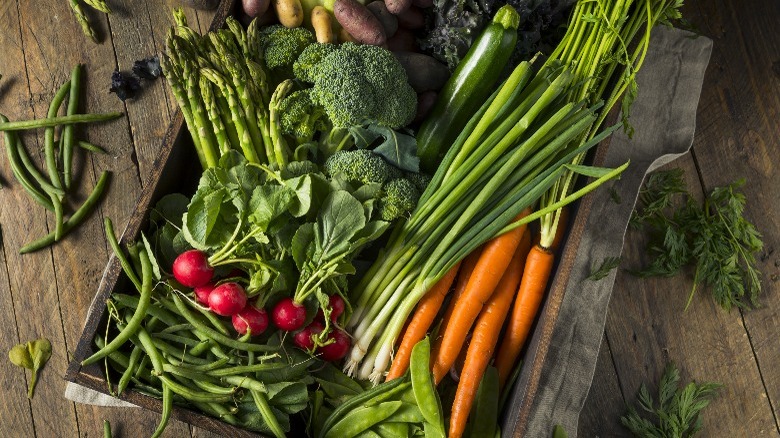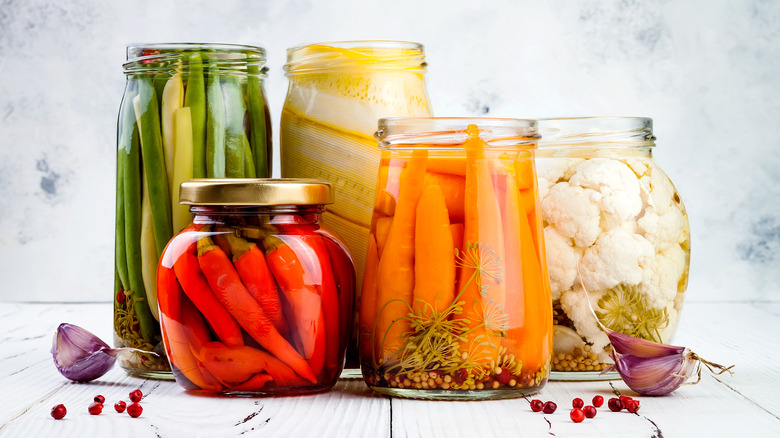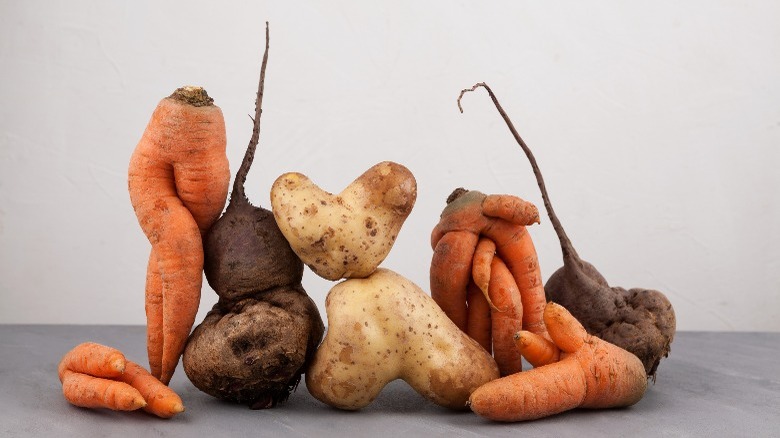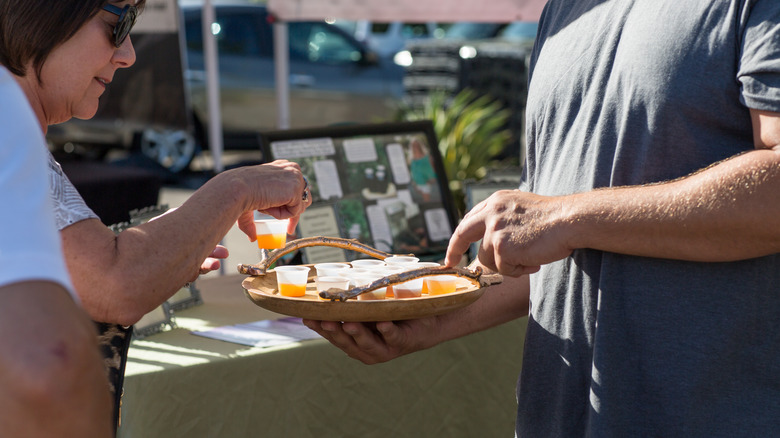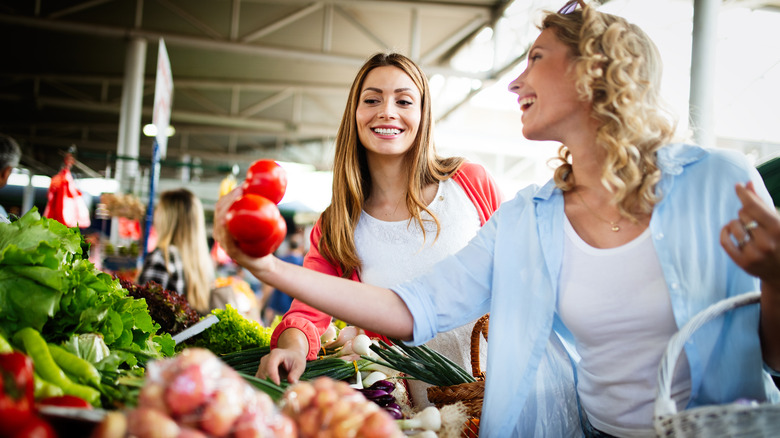12 Crucial Tips You Should Know When Shopping At A Farmers Market
At a farmers market, local vendors sell products directly to consumers. Some such markets are seasonal, only operating during certain times of the year. These usually occur from the late spring to early fall. But in warmer climates, these markets are open year-round.
There are a lot of reasons to shop at a farmers market. The produce is fresher than you can find at your supermarket. Plus, you can meet the farmers, which is a great way to learn more about where your food comes from and get to know your community. Besides fresh fruits and vegetables, lots of other products — like local honey, homemade cheese, bread, jams, and chutneys — are also sold. Some markets even have beauty products, like handmade soaps and creams.
When you choose to shop at a farmers market, you're not just getting the freshest produce possible. You're also supporting farmers and the local economy. You're helping reduce your own carbon footprint since produce doesn't travel as far to get to you. But before you head out, there are some crucial tips to know. These will help you make the most of your shopping trip.
1. Get there early
The early bird gets the worm, especially at the farmers market. It's best to arrive at the market early in the day, as this is the best time to shop. Many small vendors only have a certain amount of products daily, so if you arrive late, they may have sold out of your favorite leafy greens or specialty bread. Of course, you don't want to arrive too early, like when vendors are still setting up. Arriving about fifteen minutes after the doors have opened is good. This lets you get the first pick, while not pressuring vendors.
Some shoppers prefer to hit the farmers market closer to the end of the day, with hopes of getting discounts on unsold items. Some vendors will give deals at this time because they're trying to get rid of their entire inventory. But not every vendor sees it this way. Some farmers get frustrated with late shoppers. They may feel these deals aren't fair for their regular customers. Keep this in mind if you decide to show up late, hoping to pay less.
2. Bring cash
Cash is king at the farmers market. Some vendors may be on the cutting edge and bring their own machines. But others will not. Even in the age of technology and easy payment options, many vendors still prefer to deal with cash. Make it easy on yourself and the vendor by having a few bills on hand. If you do not have cash, you might miss out on your favorite products. You'll also keep the vendor from making an all-important sale.
Small bills are best. Try to get a few of these from the ATM before you hit up the farmers market. If you don't, you'll take up the vendor's cash while they're making change. It can be annoying if you use a $50 bill to buy $5 worth of carrots.
Today, many farmers markets accept EBT or SNAP benefits, allowing those who receive government assistance to purchase certain food items, or seeds needed to grow food. Each individual market may have a different policy on something like this. But some markets will have an area where you can swipe your EBT card, then get food credits to spend at individual vending booths.
3. Look around first
There is a lot to see at the farmers market, so you'll want to look around and at what's available. Don't just buy from the first vendor you see. Instead, take a lap and consider what's out. Some vendors only show up on certain days. Others have specialty items that aren't always available. We recommend walking around the market first before you buy anything.
Of course, it's easy to get overwhelmed by all of the products. Many local markets sell more than just fruits and vegetables. You can find farm-fresh eggs, homemade vinegar, locally-made cheese and milk, and more. Some markets even have arts and crafts for sale. However, you are doing a disservice to the entire farmers market but not first getting a feel for what's available. Take some time to think about how you want to spend your money. You will be glad that you did.
4. Don't be shy
Farmers and vendors are highly knowledgeable about their products. As such, we recommend getting to know more about them and their products. One way to do this is to follow them on social media. Another way is to get acquainted with them in person.
Building relationships is appreciated, especially if you visit the market regularly. If you get to know your vendor, they may share insider tips with you, like how to choose the freshest produce or how to cook a vegetable a certain way. Plus, getting to know farmers is a way to feel connected to where your food comes from. There's no need to hesitate, as most vendors are more than happy to chat about their products. Asking questions is encouraged.
However, be considerate. Notice if a vendor is too busy to talk. Farmers are there to do business. If you're buying something and generally have questions, they're probably happy to chat, but if you aren't buying anything and simply pestering them with questions about heirloom tomatoes, then you're keeping them from other customers.
5. Don't negotiate or haggle
You would never bargain at the supermarket or the mall, so why would you do it at the farmers market? Growing food is hard work. We think farmers deserve every penny of the price they've listed for products. When shopping at the farmers market, you're buying directly from these farmers, so respect their hard work by not trying to get a better deal. It's embarrassing for everyone involved.
If you don't like the price of something, see if another vendor has a similar product for less money. Most markets don't have set prices, so you may find the cost of one pound of tomatoes varies from vendor to vendor. You might be able to find a better deal on a particular product this way, without offending a farmer by haggling for lower prices. If you can't find the price you want, you might want to buy that item from somewhere else, like a grocery store.
6. Have a meal plan
The farmers market can be overwhelming. There are many vendors and fun things to look at. You might get seduced by sweet watermelon, brightly colored beets, plump strawberries, or creamy homemade cheese. This can cause you to buy things that you don't need. It could even lead you to purchase things you don't know how to use. You don't want to get home and find that you've spent your money on ingredients that you don't know how to cook with.
To make the most of your experience, go in with a plan. Have an idea in mind of what you need to purchase, as well as how you plan on using your haul of fresh goodies. Meal planning can help you save time and money, plus you prevent you from wasting food. Food waste is a big problem, especially in the United States. The average American wastes approximately one pound of food each day. As consumers, we can help offset food waste at home by thinking ahead. This includes before our trips to the farmers market.
7. Understand the seasons
One of the best ways to eat a healthy diet is to eat by the seasons. You can easily do this at the farmers market. In spring, look for fruits like apricots, strawberries, and pineapples, as well as vegetables like mushrooms, radishes, and asparagus. In summer, purchase fruits such as watermelon, cherries, and mangos, plus veggies like corn, eggplants, and peppers. In fall, fruits like apples and pears are at their peak, whereas vegetables like squash and pumpkins are peaking. In winter, your options are more limited. But you can still take advantage of the citrus season by buying lemons and limes. You can also purchase veggies like potatoes and leafy greens.
Learning to eat seasonally takes a little time, practice, and creativity. It helps to try out seasonal recipes, like Caprese salad in the summer, butternut squash soup in the fall, and citrus salad in the winter. Eating seasonally may also offer some health benefits. According to Eat the 80, these fruits and vegetables may contain more nutrients than out-of-season veggies.
8. Buy in bulk
If you buy items in bulk from the farmers market, you can save money. In addition to getting a better deal, you can also stay stocked with certain fruits and vegetables throughout the rest of the year. For example, fresh berries are delicious, but they're best during the summer. To extend their shelf life, you can load up on fresh berries when they are ripe, then freeze some for later.
There are ways of preserving food other than freezing, like fermenting and dehydrating. Fermenting food is a historic practice. Throughout history, humans have fermented foods as a way to save food for long winters. You can take a page from history and start fermenting extra produce. When you bring home extra cabbage, make sauerkraut or kimchi. You could also use tomatoes to make an Italian marinara sauce or a delicious salsa. You can also dehydrate food. Chef Chris Bianco told Food & Wine that food dehydrators are a great way for home chefs to learn to make the most of seasonal produce.
Canning is another way to preserve food. Like fermentation, it's a method that used to be more popular. Recently, the art of canning has been making a comeback, as home chefs are using the strategy to extend the shelf life of their food and stretch their budget.
9. Don't fear ugly produce
Don't judge a book by its cover is great advice. It applies to shopping at the farmers market, too. Just because a fruit or vegetable looks different than the ones you find at the grocery store, it doesn't mean they are bad. Unfortunately, many shoppers are biased against unusually-shaped produce.
Most of the time, foods have a uniform look due to the USDA grading system which has strict guidelines for the appearance of produce. In addition to the USDA system, most retailers have another set of guidelines that are specific to their company. This is why fruits and vegetables that are misshapen are deemed inedible, even though they are perfectly fine to consume.
At the farmers market, you will come across fruits and vegetables that look a little wonky, but they are fine to eat. Just because a carrot has an extra leg or an apple has an extra lump, it doesn't mean that you can't eat them. However, you should still use your best judgment to avoid foods that don't look as fresh, such as items that are discolored, smell bad, or have changes in texture.
10. Accept samples, but not too many
Many farmers market vendors provide samples of their products, so shoppers can see if they want to buy them. Vendors know that by giving free samples, they are building relationships with their customers. Customers who try free samples feel a sense of trust in the vendor. This may make them more inclined to make a purchase.
Shoppers should not hesitate to take these samples. Feel free to grab some cheese, taste a fresh strawberry, or bite into a delicious cube of sourdough bread. However, don't go overboard on the samples. Don't take more than one, don't sample something you know you aren't planning to buy, and maybe don't take a sample if you already know you want to buy the product. But if you're still deciding whether or not to buy something, this is the perfect scenario in which you should take a sample. It's even a good opportunity to chat with a vendor.
11. Bring your own bags
Depending on where you live, you may already be accustomed to taking reusable bags to the supermarket. But if you aren't used to it, you should invest in bags that you can continue to use on multiple shopping trips, including visits to your local farmers market. Vendors don't usually provide bags for customers. They expect you to bring your own. Not only is it polite to not expect the vendors to provide a bag, but it's better for the planet to use reusable cloth bags.
These bags are often sold at supermarkets and other stores. If you know your way around a sewing machine, you can make your own easily from old shirts. At first, it may be challenging to remember those bags. But if you leave them in your car, they will always be ready for a shopping trip. Just clean them regularly because they get a little grimy after several uses.
12. Be open-minded
Come to the farmers market with an open mind. With so many products, you are bound to find something new. What you try may even become your favorite. It's easy to get into a food rut and make the same few recipes over and over. But stepping out of your comfort zone and trying new types of farmers market produce can help you branch out.
While you're doing that, it's also a good idea to learn some new cooking techniques. Many people think they don't like a vegetable when they really just don't know how to cook it. Boiled brussels sprouts are not appealing. But roasted, they become crispy and delicious. You may think kale is gross, but that's just because you haven't made kale chips. Don't avoid vegetables just because you think you don't like them. A whole new world of ingredients opens up to you, all thanks to the amazing vendors that make up the farmers market.
